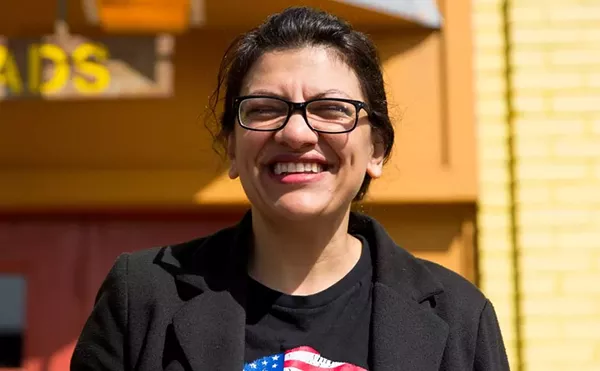Steve Wilson, veteran investigative reporter for WXYZ-TV Channel 7, put on quite a show a couple of weeks ago when he confronted Detroit’s top school official and accused him of failing to account for public funds.
Wilson’s showdown with Dr. Kenneth Burnley occurred at Cobo Hall on Nov. 13. Burnley, the Detroit Public Schools’ CEO, was there for the announcement of a $6 million grant that will establish a program to help Detroit get better teachers.
But Wilson wasn’t there to cover that story. His mission was to demand that Burnley answer his questions about spending on the district’s new administrative offices in the Fisher Building. Wilson traipsed alongside Burnley as he walked through Cobo toward a scheduled reception with schoolkids. The news sleuth wielded a microphone and waved purportedly incriminating documents as he peppered Burnley with questions. A cameraman backpedaled in front of them, filming the awkward parade.
Wilson and Burnley made physical contact at several points as they strode forth. Burnley told Wilson he would answer his questions after he completed his scheduled obligations. He repeatedly asked Wilson to quit bumping into him. When he wouldn’t, Burnley’s exasperation turned to anger. He berated Wilson as “rude” and “unprofessional.” Wilson and the school district’s director of public relations exchanged healthy forearm shivers at one point.
Wilson’s account of his quest for accountability aired on Channel 7 that evening. The seven-minute report — an eon by local TV news standards — was highly critical of Burnley and the school district, and it was laced with assertions that Wilson was on a crusade to defend the public’s right to know.
“If there’s any accountability, Dr. Burnley apparently figures it’s not to us,” Wilson intoned indignantly.
I knew nothing of the sordid Wilson-Burnley clash when I sat down with Wilson that very afternoon at Channel 7’s studio in Southfield. Irony of ironies, I was there to ask him to account for his own behavior, actions that have been called into question in the press.
Somewhere between Cobo Hall and the studio, Wilson had shed his high-minded right-to-know philosophy. He didn’t appreciate my questions and insisted I was wrong to ask them. He did the very thing he would accuse Burnley of doing. He proclaimed his innocence, then refused to provide any documentation that would verify his claims.
My queries to Wilson stem from his days as a TV reporter in Tampa, Fla., where he worked for WTVT, a station owned by Rupert Murdoch’s Fox Network. Wilson and his then-wife, Jane Akre (oddly, neither will say whether they’re still married — she lives in Florida), worked as a team. Wilson and Akre claimed they were fired by WTVT because they threatened to tell the Federal Communications Commission that station management had distorted the news in violation of federal regulations. Wilson and Akre sued WTVT under Florida’s whistleblower statute.
Wilson and Akre’s beef with WTVT grew out of their attempts to report on bovine growth hormone (BGH), a controversial substance given to cattle. They claimed WTVT refused to allow them to report accurately and attempted to twist the story to favor BGH’s manufacturer. Their lawsuit became something of a cause célebrè among foes of genetically altered food. Many liberals were sympathetic to them as well, owing to Murdoch’s arch conservatism. The journalists piqued the interest of other journalists, and their conflict with WTVT and Fox was featured in articles and broadcast reports. The fired couple created a Web site and, before long, set up a legal fund — Citizens Fund for the Right to Know — and began seeking contributions.
Wilson, who acted as his own attorney, lost his claim against his former employer. But the jury found for Akre and awarded her $425,000. An appellate court then overturned that verdict, which Akre is challenging.
I became aware of Wilson’s story when John Sugg, senior editor of the Creative Loafing newsweekly in Atlanta (who had once worked in Tampa) wrote a piece disclosing that Wilson and Akre had purchased a $1.4 million residence on the beach near Jacksonville, Fla., and did so with a down payment in excess of $1 million.
Journalism trade Web sites and message boards picked up the story, and — after learning that Wilson had worked for WXYZ in Southfield for two years — so did I.
I went to Channel 7’s studio to give Wilson a chance to respond to questions that were being raised about the dispensation of money donated to the legal fund. He and Akre are still soliciting funds on their Web site (www.foxbghsuit.com), saying they had “put our pride aside” to seek assistance and are “hoping to get back on our feet.”
Wilson’s first comment to me was comforting. “As a guy who makes a living holding people accountable, I’m extremely aware of the need for accountability,” he told me. “I think the press is far too frequently not accountable.”
He said he and Akre had not used money from the legal fund to purchase the home. He found it odd that I believed the real estate acquisition was newsworthy.
I did what any competent reporter would do and asked him to provide me with an account history on the legal fund. He stonewalled. I told him that if he had done nothing wrong, as he insisted, then a complete accounting of the legal fund would provide some measure of vindication and silence the speculation swirling through the journalism community. I’d report my findings in my column.
Wilson hemmed and hawed, then suggested that he might turn over an account history — provided I would agree not to write this column if the documents seemed to be in order. I refused. I know of no sane journalist who would make such a pledge. I doubt Wilson would.
Wilson not only refused to provide the account history. He refused to say how much had been donated to the legal fund. He refused to identify anyone who had donated. He even refused to provide a copy of his résumé.
Under Florida law, people and groups asking the public for donations are required to register with the state and provide accounting. Though he has been seeking funds for years, he has not registered. Wilson told me on Nov. 13 that he intended to register “in the next few days.” As of 4 p.m. on Monday, Nov. 24, he had not done so. Officials of the Florida Department of Agriculture and Consumer Services said anyone who solicits contributions — religious, government and educational institutions are exempted — is required to register. Cheryl Fralick, regulatory consultant at the agency, told me that Wilson and Akre have been soliciting donations in violation of that law.
“The truth is that every penny contributed in our legal fight (which continues) was ultimately spent on lawyers, court transcripts, filing fees, and the like — and any contributor to our fund is and always has been welcomed to the documentation that proves his/her money went no place else,” Wilson says in a prepared statement. “I should note that even after the spreading of these allegations, not a single contributor has called to question our motives or ask for proof that we never misled them.”
(In a sworn deposition he gave during litigation with WTVT, Wilson admitted that he had once removed $5,000 from the Citizens Fund and placed it “under my mattress.” He testified that he had done so because he feared the Internal Revenue Service would get the money.)
His prepared statement continues: “So, why don’t we just bare all the private financial records which disprove any suspicions? First, because our supporters agree it’s just simply none of the business of every cynical individual on a fishing expedition. And more importantly because in a civilized society, absent any evidence whatsoever to the contrary, honest people ought not to be obligated to prove their integrity.”
Reached at home in Florida, Akre initially echoed Wilson’s lofty philosophy. “I agree that people should be forthcoming, especially when they’re journalists,” she said.
Unfortunately, she also echoed his belief that they had no obligation to account for the Citizens Fund for the Right to Know, saying, “There’s no story.”
Like Wilson, Akre is fond of responding to questions with questions, and Arke asked me to explain why I thought it was newsworthy. I tried, apparently unconvincingly. I said reasonable people might question the propriety of pleading poverty and soliciting money while buying a pricey home.
“So what?” she rejoined. “You spend time with young boys — so you’re a pedophile. The dots don’t connect.”
It’s a safe bet that Wilson and Akre — both masters of obfuscation and bluster — will respond to my piece in the fashion they react to anyone who deigns to question their behavior. They’ll write letters of complaint to me, to my publisher, to Metro Times’ owners. They will question my motives, professionalism and integrity.
But just as Wilson’s hounding of Burnley did nothing to inform the public about how their tax dollars are spent, Wilson’s accusations against me will do nothing to settle questions about his conduct. In fact, they will be specifically designed to distract from those questions.
By arrogantly refusing to do the right thing — the simple thing — and account for the legal fund, he is making himself into a poster kid for journalistic duplicity.
WXYZ is along for the ride.
I called Grace Gilchrist, WXYZ’s general manager, for comment on Wilson and his fund-raising.
“I have no idea what you’re talking about, and don’t quote me on this. We are off the record,” Gilchrist said.
I informed her that we were not off the record.
“Well, then, goodbye,” she said, and hung up.
Jeremy Voas is editor of Metro Times. E-mail [email protected]





